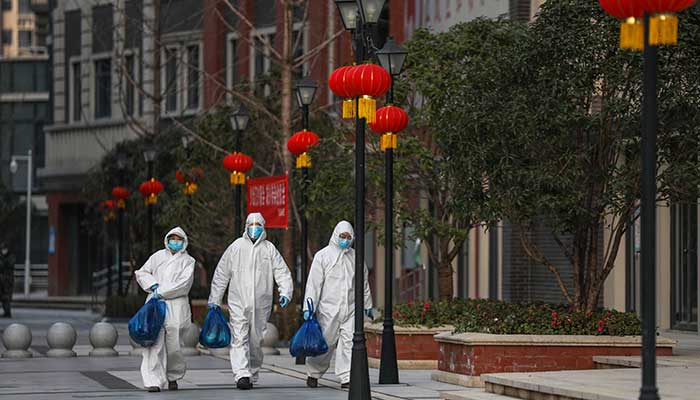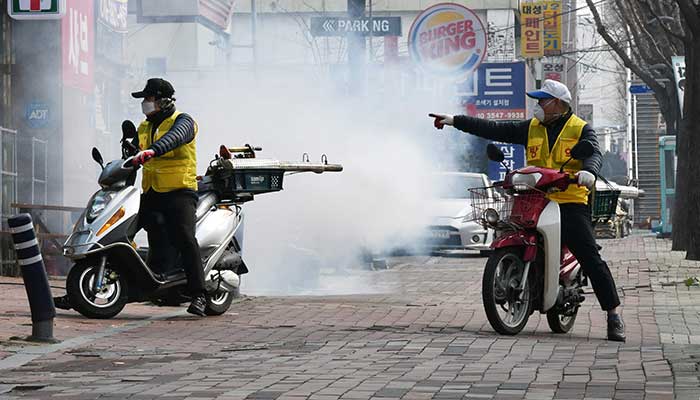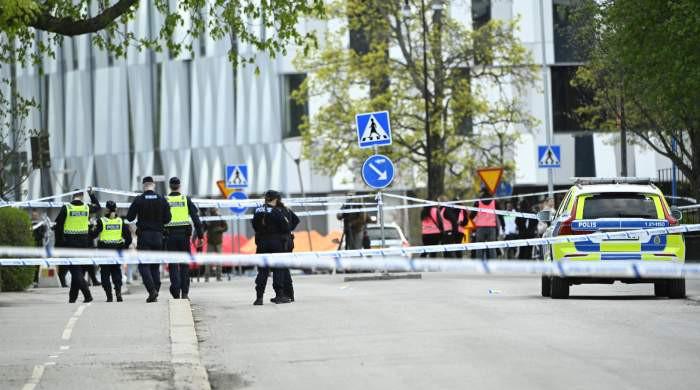Spike in spread of coronavirus in China and abroad rekindle concerns
Who has warned nations could face a serious problem if they fail to "hit hard now" against the virus
February 21, 2020

BEIJING: Emergence of new coronavirus cases in South Korea, Iran and Chinese hospitals and prisons renewed concerns on Friday over the spread of the disease that has taken the lives of more than 2,200 people.
The World Health Organisation warned nations could face a serious problem if they fail to "hit hard now" against the virus, which has infected more than 75,000 in China and over 1,100 abroad.
China has pointed to official figures showing new cases slowing this week as evidence that its drastic containment measures are working, but fresh infections emerged at two Beijing hospitals, and more than 500 others were reported in prisons across the country.
Chinese authorities have placed tens of millions of people under quarantine in hard-hit central Hubei province and restricted movements in other cities far from the epicentre.
Also read: Asia-Pacific airlines may lose $27.8 billion as coronavirus impact deepens
Many nations have banned travellers from China and airlines have suspended flights to and from the country.
But clusters and outbreaks continue to emerge, and 11 people have now died outside mainland China.
Chinese officials said a potential vaccine could be submitted for clinical trials around late April.
South Korean sect
The total number of cases in South Korea nearly doubled to 204 on Friday, making it the hardest-hit country outside China.
More than 120 members of Shincheonji Church of Jesus, a religious sect in the southern city of Daegu, have now been infected.

It started with a 61-year-old woman who developed a fever on February 10 but attended at least four church services before being diagnosed.
The mayor of Daegu — South Korea's fourth-biggest city, with a population of over 2.5 million — has advised residents to stay indoors, while access to a major US base in the area has been restricted.
Most people on the streets were wearing masks on Friday, but many businesses were closed and workers sprayed disinfectant outside the church.
"With so many confirmed cases here I'm worried that Daegu will become the second Wuhan," said Seo Dong-min, 24, referring to Hubei's capital, where the virus first emerged.
Iran confirmed three new cases after two elderly men died from the virus in the city of Qom, prompting Iraq to ban travel to and from its neighbour and Kuwait's national air carrier to suspend flights.
Also read: China announces biggest drop in new coronavirus cases
Two Australians evacuated from the Diamond Princess cruise ship, meanwhile, tested positive for coronavirus on their return home despite being cleared in Japan.
The two cases in Australia will fuel questions about Tokyo's policy of allowing former Diamond Princess passengers to return home after testing negative.
Two former passengers, both Japanese and in their 80s, died in Japan on Thursday.
WHO chief Tedros Adhanom Ghebreyesus said on Thursday that now "is the time to attack the virus" while the number of cases abroad remains low.
"If we don't hit hard now using the window of opportunity we might be faced with a serious problem," he said.
"This virus is very dangerous and it's public enemy number one and it's not being treated as such."
Prisons and hospitals
China reported 118 more deaths on Friday, raising the toll to 2,236, most of the them in Hubei.
The National Health Commission also said in its daily update that China tallied 889 new cases.
The number is up from the previous day when it reported the lowest number of new infections in nearly a month, fuelling hopes that the epidemic is nearing its peak.
Among those, 258 were outside Hubei, ending a 16-day streak of new infections falling in the rest of the country.
New hotspots were found in prisons and hospitals.
Also read: Death toll from coronavirus rises to 2,000 in China
Seven guards and 200 inmates tested positive for the virus at Rencheng prison in eastern Shandong province. Eight officials were fired over the issue.
In Hubei, 230 cases were reported at the Wuhan Women's Prison, whose warden was also dismissed, and 41 others at a penitentiary in Shayan county. One infection was found at a juvenile detention centre.
Another 34 cases have been found at Shilifeng prison in eastern Zhejiang province, leading to the ouster of its director and another official.
In Beijing, health officials said 36 people, including medical staff, patients and their families, have now tested positive for the virus at Fuxing hospital, which has been under partial lockdown since January 31.
At Peking University People's Hospital, a patient became infected after a visit from two relatives who tested positive for the virus.
Most of China remains paralysed over fears of contagion, with people slowly trickling back to work, schools remaining closed, and Beijing ordering people returning to the city to self-quarantine for 14 days.











